-
 bitcoin
bitcoin $87959.907984 USD
1.34% -
 ethereum
ethereum $2920.497338 USD
3.04% -
 tether
tether $0.999775 USD
0.00% -
 xrp
xrp $2.237324 USD
8.12% -
 bnb
bnb $860.243768 USD
0.90% -
 solana
solana $138.089498 USD
5.43% -
 usd-coin
usd-coin $0.999807 USD
0.01% -
 tron
tron $0.272801 USD
-1.53% -
 dogecoin
dogecoin $0.150904 USD
2.96% -
 cardano
cardano $0.421635 USD
1.97% -
 hyperliquid
hyperliquid $32.152445 USD
2.23% -
 bitcoin-cash
bitcoin-cash $533.301069 USD
-1.94% -
 chainlink
chainlink $12.953417 USD
2.68% -
 unus-sed-leo
unus-sed-leo $9.535951 USD
0.73% -
 zcash
zcash $521.483386 USD
-2.87%
What role does NFT play in the metaverse? How are digital assets confirmed and circulated?
NFTs revolutionize digital ownership in the metaverse, enabling secure trading and exclusive access, all confirmed and circulated via blockchain technology.
May 08, 2025 at 01:56 pm
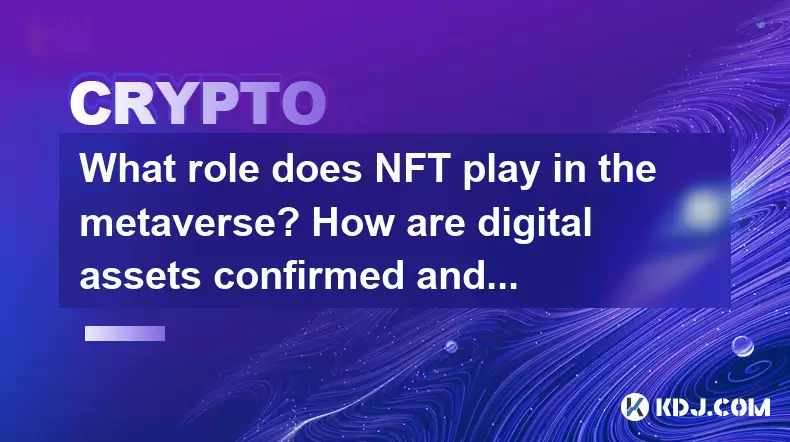
The integration of Non-Fungible Tokens (NFTs) into the metaverse has revolutionized the way digital assets are owned, confirmed, and circulated within these virtual spaces. NFTs, unique digital tokens that represent ownership of a specific item or piece of content, have become integral to the functioning and economy of the metaverse. This article delves into the role of NFTs in the metaverse and explains how digital assets are confirmed and circulated.
The Role of NFTs in the Metaverse
NFTs serve as the backbone of digital ownership within the metaverse. They provide a means to verify and prove ownership of virtual assets, ranging from digital art and music to virtual real estate and in-game items. This unique ability to establish indisputable ownership is crucial in a digital environment where traditional concepts of ownership do not apply.
In the metaverse, NFTs enable users to buy, sell, and trade virtual assets with confidence. Each NFT is linked to a specific asset through blockchain technology, ensuring that once an asset is sold, the ownership is transferred seamlessly and transparently. This process not only fosters a vibrant economy but also encourages creators to produce more content, knowing their work can be monetized securely.
Moreover, NFTs in the metaverse facilitate unique experiences and interactions. For instance, owning an NFT can grant access to exclusive virtual events or areas within the metaverse. This adds a layer of exclusivity and value to NFTs, making them more than just digital collectibles but also keys to enhanced virtual experiences.
How Digital Assets are Confirmed in the Metaverse
The confirmation of digital assets in the metaverse is primarily achieved through blockchain technology. Blockchain serves as a decentralized ledger that records all transactions and ownership details of NFTs. When a digital asset is created or transferred, the transaction is recorded on the blockchain, providing an immutable record of ownership.
To confirm ownership of a digital asset, users can access the blockchain to view the transaction history of the NFT. This transparency ensures that the ownership of any asset can be verified at any time, preventing fraud and ensuring that only the rightful owner can claim and use the asset.
Additionally, smart contracts play a crucial role in confirming digital assets. These self-executing contracts automatically enforce the rules and conditions of an NFT transaction. For example, when an NFT is sold, the smart contract ensures that the payment is transferred to the seller and the ownership is updated on the blockchain, all without the need for intermediaries.
Circulation of Digital Assets in the Metaverse
The circulation of digital assets in the metaverse is facilitated by various platforms and marketplaces that support NFT transactions. These platforms provide a space for users to list, buy, and sell their NFTs, creating a dynamic marketplace where digital assets can be easily exchanged.
To circulate a digital asset, a user typically follows these steps:
- List the NFT on a marketplace: The user selects a platform that supports the type of NFT they wish to sell and lists it with a set price or for auction.
- Buyers browse and purchase: Potential buyers can browse the marketplace, view the details of the NFT, and decide to purchase it. The transaction is then processed through the platform.
- Transaction recorded on blockchain: Once the purchase is complete, the transaction is recorded on the blockchain, updating the ownership of the NFT.
- Asset transferred to buyer: The buyer receives the NFT in their digital wallet, and they can now use or resell the asset as they see fit.
This process ensures that digital assets can be circulated efficiently and securely within the metaverse, fostering a thriving economy.
Integration of NFTs with Virtual Real Estate
One of the most significant applications of NFTs in the metaverse is in the realm of virtual real estate. NFTs are used to represent ownership of virtual land and properties, allowing users to buy, sell, and develop these digital spaces. This has led to the creation of virtual cities and communities where users can interact, build, and monetize their virtual assets.
The process of buying virtual real estate involves selecting a plot of land on a metaverse platform, purchasing it with cryptocurrency, and receiving an NFT that represents ownership. This NFT can then be used to prove ownership and can be sold or traded like any other asset. The integration of NFTs with virtual real estate has opened up new opportunities for investment and development within the metaverse.
NFTs and Digital Identity in the Metaverse
NFTs also play a role in establishing digital identity within the metaverse. Users can use NFTs to represent their digital personas, avatars, and personal items, creating a unique and verifiable identity. This can enhance the user experience by allowing for personalized interactions and the ability to carry one's digital identity across different metaverse platforms.
To create a digital identity using NFTs, users can:
- Mint an NFT representing their avatar: This NFT can include details such as appearance, accessories, and other personal attributes.
- Link the NFT to their digital wallet: By associating the NFT with their wallet, users can prove ownership and use their avatar across different platforms.
- Use the NFT to access personalized experiences: Certain metaverse platforms may offer exclusive content or areas based on the user's digital identity, enhancing the overall experience.
This use of NFTs for digital identity adds another layer of functionality and personalization to the metaverse, making it a more immersive and engaging environment.
Challenges and Considerations
While NFTs have brought significant benefits to the metaverse, there are also challenges and considerations to be aware of. The environmental impact of blockchain technology, particularly those using proof-of-work consensus mechanisms, is a concern. The energy consumption associated with minting and trading NFTs can be substantial, prompting a need for more sustainable solutions.
Additionally, the issue of copyright and intellectual property rights in the metaverse is complex. Ensuring that NFTs do not infringe on existing rights and that creators are fairly compensated is crucial. Platforms and users must navigate these legal considerations to maintain the integrity and legality of NFT transactions.
Finally, the accessibility and inclusivity of the metaverse and NFT ecosystem are important considerations. Ensuring that all users, regardless of their technical expertise or financial resources, can participate in the metaverse is essential for its growth and sustainability. Efforts to lower barriers to entry and educate users about NFTs and the metaverse can help achieve this goal.
Frequently Asked Questions
Q: Can NFTs in the metaverse be used for purposes other than ownership and trading?A: Yes, NFTs in the metaverse can also be used for access control, granting users entry to exclusive events or areas, and for establishing digital identities, allowing users to personalize their virtual experiences.
Q: How do NFTs ensure the uniqueness of digital assets in the metaverse?A: NFTs ensure the uniqueness of digital assets through blockchain technology, which assigns a unique identifier to each NFT. This identifier is recorded on the blockchain, making it impossible to duplicate or alter the asset's ownership.
Q: What happens if an NFT in the metaverse is lost or stolen?A: If an NFT is lost or stolen, the owner must rely on the security measures of their digital wallet and the policies of the platform where the NFT was purchased. Some platforms offer recovery options or insurance, but prevention through secure storage is the best approach.
Q: Are there any fees associated with NFT transactions in the metaverse?A: Yes, NFT transactions in the metaverse often involve fees, including gas fees for blockchain transactions and platform fees for listing and selling NFTs. These fees can vary depending on the blockchain and platform used.
Disclaimer:info@kdj.com
The information provided is not trading advice. kdj.com does not assume any responsibility for any investments made based on the information provided in this article. Cryptocurrencies are highly volatile and it is highly recommended that you invest with caution after thorough research!
If you believe that the content used on this website infringes your copyright, please contact us immediately (info@kdj.com) and we will delete it promptly.
- The Epstein Files & Satoshi's Shadow: Emails Exposed, Crypto's Past Reimagined
- 2026-02-03 12:35:01
- BlockDAG's $450M+ Presale Countdown: The 100x Opportunity About to Vanish
- 2026-02-03 12:50:01
- Bitcoin Price Plummets Below Key Thresholds Amid Market Shift: What Investors Need to Know
- 2026-02-03 13:20:01
- SpaceCoin Unveils 10% APR Staking Program, Pioneering Decentralized Satellite Internet
- 2026-02-03 13:20:01
- Gold, Silver See Seismic Shifts: Margin Hikes Spark Volatility, But Resilience Shines Through
- 2026-02-03 13:15:01
- Coast Mountain Transit Workers Kick Off Bargaining, Demanding Fair Wages and Safer Conditions
- 2026-02-03 09:55:01
Related knowledge

What role does NFT play in the metaverse? How are digital assets confirmed and circulated?
May 08,2025 at 01:56pm
The integration of Non-Fungible Tokens (NFTs) into the metaverse has revolutionized the way digital assets are owned, confirmed, and circulated within...
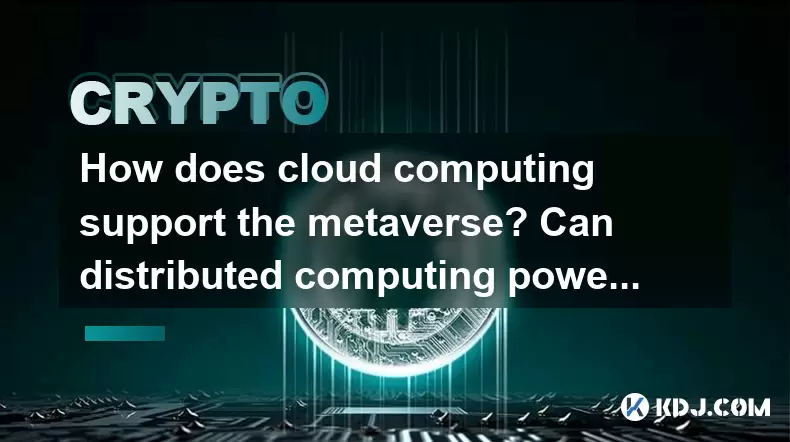
How does cloud computing support the metaverse? Can distributed computing power meet huge demands?
May 08,2025 at 05:15pm
Cloud computing plays a pivotal role in supporting the metaverse, a virtual reality space where users can interact with a computer-generated environme...
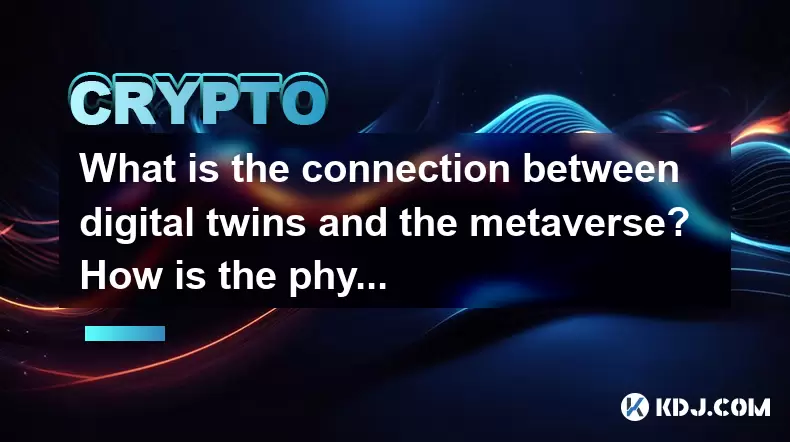
What is the connection between digital twins and the metaverse? How is the physical world mapped to the virtual space?
May 08,2025 at 05:43am
The concept of digital twins and the metaverse has become increasingly intertwined within the cryptocurrency and blockchain community, as both technol...
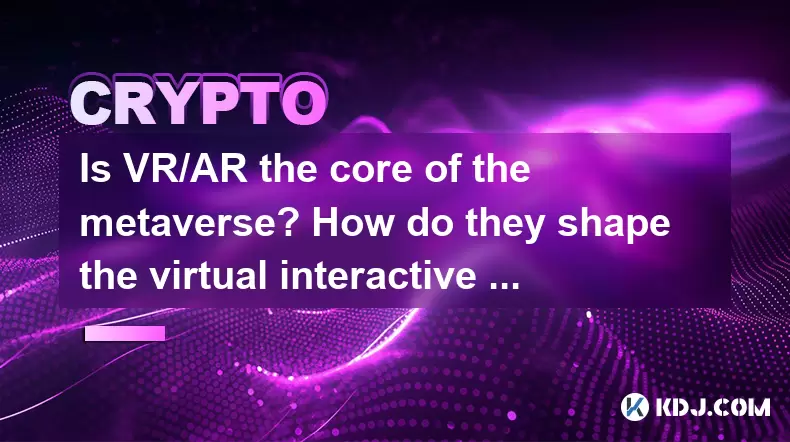
Is VR/AR the core of the metaverse? How do they shape the virtual interactive experience?
May 11,2025 at 02:15pm
The concept of the metaverse has become increasingly popular within the cryptocurrency circle, often intertwined with discussions about virtual realit...
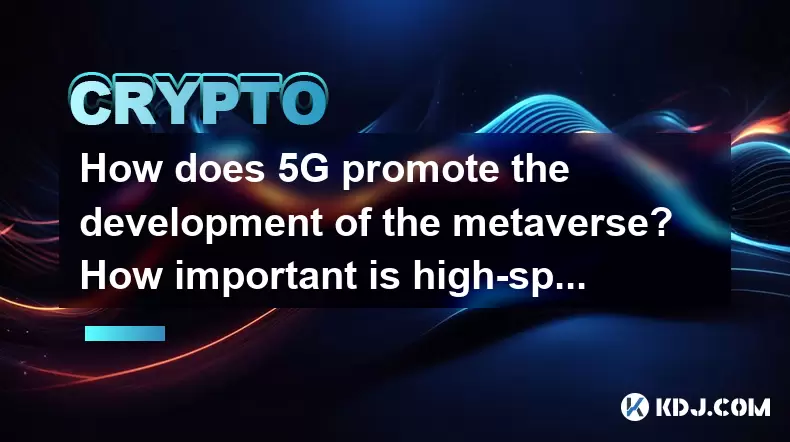
How does 5G promote the development of the metaverse? How important is high-speed network for immersive experience?
May 08,2025 at 04:21am
The relationship between 5G technology and the development of the metaverse is intricate and pivotal. 5G, with its high-speed, low-latency, and high-c...
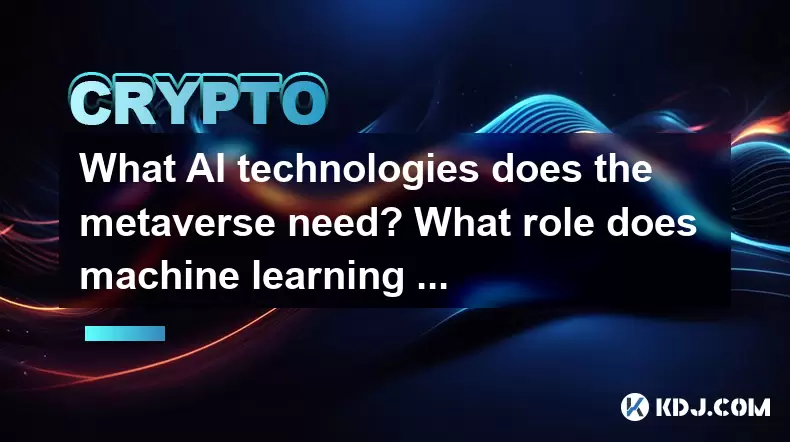
What AI technologies does the metaverse need? What role does machine learning play in virtual environments?
May 08,2025 at 06:08am
The metaverse, a collective virtual shared space, relies heavily on advanced AI technologies to create immersive and interactive environments. AI tech...

What role does NFT play in the metaverse? How are digital assets confirmed and circulated?
May 08,2025 at 01:56pm
The integration of Non-Fungible Tokens (NFTs) into the metaverse has revolutionized the way digital assets are owned, confirmed, and circulated within...

How does cloud computing support the metaverse? Can distributed computing power meet huge demands?
May 08,2025 at 05:15pm
Cloud computing plays a pivotal role in supporting the metaverse, a virtual reality space where users can interact with a computer-generated environme...

What is the connection between digital twins and the metaverse? How is the physical world mapped to the virtual space?
May 08,2025 at 05:43am
The concept of digital twins and the metaverse has become increasingly intertwined within the cryptocurrency and blockchain community, as both technol...

Is VR/AR the core of the metaverse? How do they shape the virtual interactive experience?
May 11,2025 at 02:15pm
The concept of the metaverse has become increasingly popular within the cryptocurrency circle, often intertwined with discussions about virtual realit...

How does 5G promote the development of the metaverse? How important is high-speed network for immersive experience?
May 08,2025 at 04:21am
The relationship between 5G technology and the development of the metaverse is intricate and pivotal. 5G, with its high-speed, low-latency, and high-c...

What AI technologies does the metaverse need? What role does machine learning play in virtual environments?
May 08,2025 at 06:08am
The metaverse, a collective virtual shared space, relies heavily on advanced AI technologies to create immersive and interactive environments. AI tech...
See all articles

























![Discontinuum by: ArchitechGD 100% (1 coin) (Mobile) Geometry Dash [2.2] Discontinuum by: ArchitechGD 100% (1 coin) (Mobile) Geometry Dash [2.2]](/uploads/2026/02/03/cryptocurrencies-news/videos/origin_69814d99e6b61_image_500_375.webp)
















































